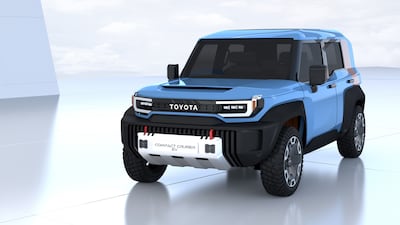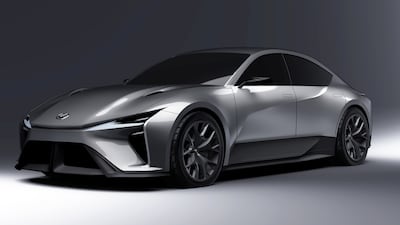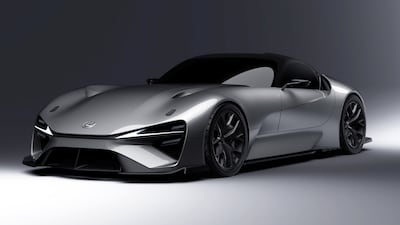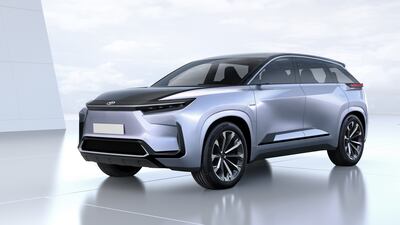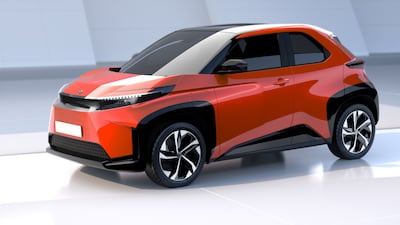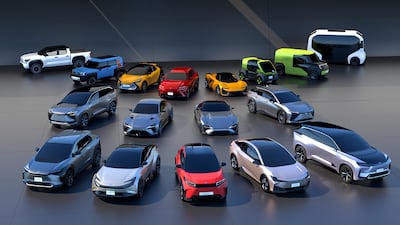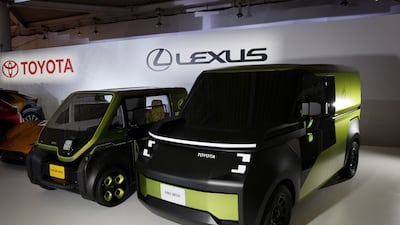Looking out across the highways of the Emirates, one has to think what the future holds for the giant and wildly popular SUV market. Each year, they are bigger, sportier and meaner than ever. But their days are numbered, especially if Toyota's latest glimpse into the future is anything to go by.
The Japanese marque has got serious about electric vehicles, showcasing no less than 17 concept models in its bid to raise its yearly EV sales goal by 75 per cent and drive down carbon emissions. Chief executive Akio Toyoda said Toyota aims to sell 3.5 million EVs a year from 2030.
There is literally something for everyone. There's a series of Lexus models that will cater to the whole family. There's a tiny city car that looks to be a natural successor to the Yaris. There's even some outrageously square "box cars" that will appeal to someone outside the airport terminal transfer segment.
But the most eye-catching of the bunch are the two bigger guys on the back row: the pickup (which will no doubt be hard as nails) and a baby blue Compact Cruiser. If the FJ Cruiser could have an offspring, this is probably it. Not a lot is known right now about the concept, but it looks like a brand-new model for what will be the competitive electric off-road segment.
The world's biggest carmaker is already at risk of falling behind rivals Volkswagen and Tesla.

Toyota had previously set a yearly sales target for 2030 of two million EVs and fuel cell vehicles. "Two million is a significant number. And we are trying to bring that to 3.5 million units," Toyoda said. "We've been thinking of our carbon neutrality initiatives, and have come up with a realistic plan."
The company currently sells about 10 million vehicles a year but did not say what proportion of future sales its new target represented.
Lexus to go all-electric by 2030
Toyota will also aim to make its high-end Lexus range 100 per cent electric by the end of the decade in the European, North American and Chinese markets, and worldwide by 2035. The company announced a total investment of eight trillion yen ($70.25 billion) for its electrification drive by 2030.
Half of that will be used for battery-powered electric vehicles, with the rest poured into other projects including hybrids and fuel cell engines. About two trillion yen will be dedicated to the production and development of auto batteries, up from the previous amount of 1.5 trillion yen.

Last month, Greenpeace ranked Toyota joint last for decarbonisation efforts in a list released during the Cop26 climate summit.
On Tuesday, Toyoda said his company was taking a "proactive" approach to the promotion of electric vehicles, adding that Toyota would continue to provide a range of products for customers to choose from.
The "energy policies of different countries" may also affect Toyota's push towards carbon neutrality, he said.
Christopher Richter, an auto analyst at CLSA, said Tuesday's announcement marked "quite a leap" for Toyota. One reason Toyota has been relatively slow to launch itself into the electric car market is that, as a traditional Japanese company, "it takes a lot of time to reach a consensus on these issues," he told AFP.
"But the good thing is once they've agreed the way to go, they tend to move rather resolutely."
- With agencies
